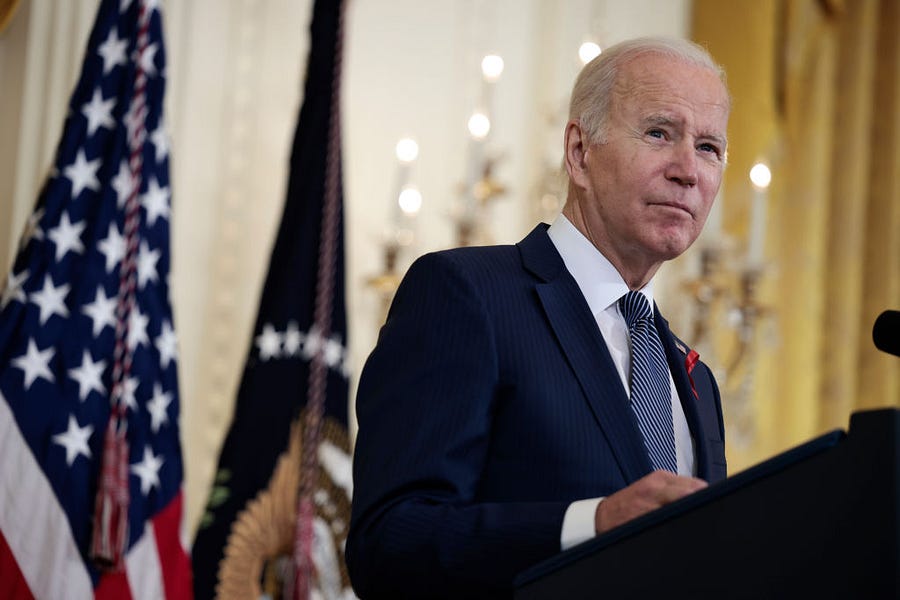On the campaign trail and as president-elect, Joe Biden vowed that his trade policy would be different from Donald Trump’s. He promised to work specifically with other democracies, saying, “I’m not looking for punitive trade. The idea that we are poking our finger in the eyes of our friends and embracing autocrats makes no sense to me.”
And a glowing joint communique announcing a decision by the United States to suspend temporarily its Section 232 tariffs seems in keeping with that promise. The U.S. will lift tariffs on steel and aluminum imports from the European Union while the EU suspends its retaliatory tariffs on a host of U.S. items, including Harley-Davidson motorcycles, Levi jeans, and bourbon whiskey. The pact will “re-establish historical transatlantic trade flows in steel and aluminum” and lead to “joint steps to defend workers, industries and communities from global overcapacity and climate change.”
But there’s more to it than that, and little of it is good news for free-trade advocates. What’s not to like? Quite a bit actually, especially if you’re a person who favors individual freedom, economic opportunity, open markets, and policies that treat people fairly. The deal simply swaps one type of protection for another—the Trump tariffs will be replaced with a quota system that automatically reimposes tariffs when imports rise above a set threshold.
On the bright side, there may be modest benefits to some steel and aluminum users who have been victimized by the tariffs. This arrangement applies only to the EU, however, so imports from most other countries will continue to be restricted. The U.S. metals market is likely to remain tight and overpriced.
Additional benefits likely will accrue to exporters who have been subject to EU retaliation; they may be able to begin rebuilding some lost overseas sales.
But simply terminating the 232 tariffs, which President Joe Biden could accomplish with the stroke of a pen and without the need for lengthy international negotiations, would yield far better results.
The dark side of this agreement is what it tells us about the administration’s trade policy priorities. Unfortunately, those policies are being developed by and for protectionists. The rest of us, though, will end up poorer for it—higher prices, fewer choices, and greater income inequality. It’s a system in which the wealthy are rewarded through government favors, while everyday Americans get stuck living with the inefficiencies and paying the higher costs.
A closer look at steel helps illuminate the situation. Even before Trump’s tariffs were imposed on imports from all countries in March 2018, America already had what likely were the highest steel prices in the world. More than 200 anti-dumping /countervailing duty restrictions (to offset unfairly low pricing of imports by foreign companies and subsidies by foreign countries, respectively) against iron and steel imports had made the United States a high-priced island in an ocean of lower-priced steel.
Additional tariffs have only driven prices higher. The market analysis service Steelbenchmarker reported on Nov. 22, 2021, that the U.S. price for hot-rolled steel was more than double (122 percent) the composite world export price and 82 percent higher than in Western Europe. Those prices are nice if you’re a U.S. steel producer, but not so delightful if you’re a consumer. And there are a lot more consumers than producers.
Steel production in the United States is a modest-sized business. As of 2019, there were 144,000 steel-mill employees. They added $31 billion of value to the economy, which is equivalent to 0.15 percent of GDP. Companies that buy steel and make useful things out of it, however, have a much bigger footprint. They employ 6.7 million workers and produce an economic value-add of $1.1 trillion (5.4 percent of GDP). So steel users employ 46 times more people and add 35 times more to GDP than do steel producers. U.S. manufacturers of finished goods can find it really difficult to compete with imported products made with world-price steel.
It’s helpful to understand the European perspective on the 232 tariff dispute. EU officials issued a statement saying they still believe the tariffs violate the U.S.’s World Trade Organization obligations. They almost certainly do, as most trade policy experts consider Trump’s claim that tariffs were necessary as a matter of national security to be bogus. The EU found it pretty much impossible to deal with the scowling protectionism of the Trump administration. In an effort to rebuild a working relationship with the United States, the EU has decided with regret to reach a temporary accommodation with the smiling protectionism of the Biden team.
Where does all this leave the international community? Much of Europe looked forward to the Biden presidency; instead they’ve gotten an agenda that’s weak on substantive change—simply a revised version of Trump’s protectionism with a friendlier face. As our country ignores trade rules it doesn’t like, other nations are encouraged to do the same.
America is the world’s largest trading nation and its second-largest exporter. Our workers, companies, and consumers have benefited enormously from the economic growth stimulated by engaging in commerce with other countries. Rather than scorning U.S. international obligations, the Biden administration should rebuild support for the rules-based global trading system by setting a proper example. We should follow those rules ourselves.
Dan Pearson, a former chairman of the U.S. International Trade Commission, is a trade policy fellow at Americans for Prosperity.








Please note that we at The Dispatch hold ourselves, our work, and our commenters to a higher standard than other places on the internet. We welcome comments that foster genuine debate or discussion—including comments critical of us or our work—but responses that include ad hominem attacks on fellow Dispatch members or are intended to stoke fear and anger may be moderated.